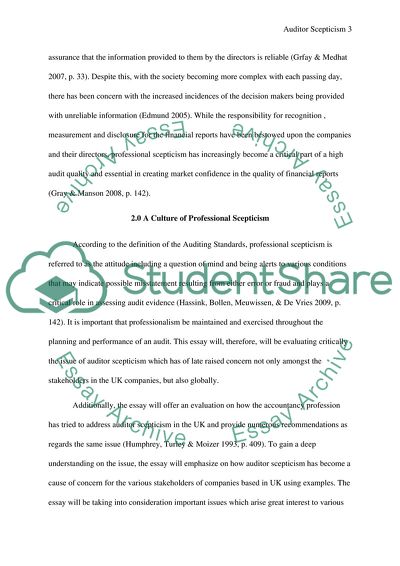Cite this document
(Auditor scepticism is an increasing concern for the profession and Essay - 1, n.d.)
Auditor scepticism is an increasing concern for the profession and Essay - 1. https://studentshare.org/finance-accounting/1798617-auditor-scepticism-is-an-increasing-concern-for-the-profession-and-stakeholders-of-uk-companies-critically-evaluate-using-selected-examples-how-the-accountancy-profession-addresses-auditor-scepticism-in-the-uk-make-recommendations-of-how-professional
Auditor scepticism is an increasing concern for the profession and Essay - 1. https://studentshare.org/finance-accounting/1798617-auditor-scepticism-is-an-increasing-concern-for-the-profession-and-stakeholders-of-uk-companies-critically-evaluate-using-selected-examples-how-the-accountancy-profession-addresses-auditor-scepticism-in-the-uk-make-recommendations-of-how-professional
(Auditor Scepticism Is an Increasing Concern for the Profession and Essay - 1)
Auditor Scepticism Is an Increasing Concern for the Profession and Essay - 1. https://studentshare.org/finance-accounting/1798617-auditor-scepticism-is-an-increasing-concern-for-the-profession-and-stakeholders-of-uk-companies-critically-evaluate-using-selected-examples-how-the-accountancy-profession-addresses-auditor-scepticism-in-the-uk-make-recommendations-of-how-professional.
Auditor Scepticism Is an Increasing Concern for the Profession and Essay - 1. https://studentshare.org/finance-accounting/1798617-auditor-scepticism-is-an-increasing-concern-for-the-profession-and-stakeholders-of-uk-companies-critically-evaluate-using-selected-examples-how-the-accountancy-profession-addresses-auditor-scepticism-in-the-uk-make-recommendations-of-how-professional.
“Auditor Scepticism Is an Increasing Concern for the Profession and Essay - 1”. https://studentshare.org/finance-accounting/1798617-auditor-scepticism-is-an-increasing-concern-for-the-profession-and-stakeholders-of-uk-companies-critically-evaluate-using-selected-examples-how-the-accountancy-profession-addresses-auditor-scepticism-in-the-uk-make-recommendations-of-how-professional.


